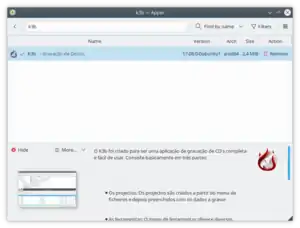PackageKit
PackageKit is a free and open-source suite of software applications designed to provide a consistent and high-level front end for a number of different package management systems. PackageKit was created by Richard Hughes in 2007,[2][3] and first introduced into an operating system as a default application in May 2008 with the release of Fedora 9.[4]
 PackageKit is a system daemon, various graphical front-ends are available | |
| Original author(s) | Richard Hughes |
|---|---|
| Initial release | 2007 |
| Stable release | 1.2.7[1]
/ 26 August 2023 |
| Repository | |
| Written in | C, C++, Python |
| Operating system | Linux |
| Type | Package management system |
| License | GNU General Public License |
| Website | www |
The suite is cross-platform, though it is primarily targeted at Linux distributions which follow the interoperability standards set out by the freedesktop.org group. It uses the software libraries provided by the D-Bus and Polkit projects to handle inter-process communication and privilege negotiation respectively.
PackageKit seeks to introduce automatic updates without having to authenticate as root, fast-user-switching, warnings translated into the correct locale, common upstream GNOME and KDE tools and one software over multiple Linux distributions.[5]
Although bug fixes are still released, no major features have been developed since around 2014, and the package's maintainer predicts that it will gradually be replaced by other tools as technologies such as Flatpak and Snap become more popular.[6]
Software architecture
PackageKit runs as a system-activated daemon, named packagekitd, which abstracts out differences between the different systems. A library called libpackagekit allows other programs to interact with PackageKit.[7]
Features include:
- installing local files, ServicePack media and packages from remote sources
- authorization using Polkit
- the use of existing packaging tools
- multi-user system awareness – it will not allow shutdown in critical parts of the transaction
- a system-activated daemon which exits when not in use
Front-ends
_%252B_GNOME_PackageKit_Update_Viewer_(gpk-update-viewer)_%252B_GNOME_PackageKit_Software_Log_Viewer_(gpk-log)_all_in_version_3.32_released_2019-03.png.webp)
pkconis the official front-end of PackageKit, it operates from the command line.[8]
GTK-based:
- gnome-packagekit is an official GNOME front-end for PackageKit. Unlike GNOME Software, gnome-packagekit can handle all packages, not just applications, and has advanced features that are missing in GNOME Software as of June 2020.
- GNOME Software is a utility for installing the applications and updates on Linux. It is part of the GNOME Core Applications and was introduced in GNOME 3.10.
Qt-based:

 Discover
Discover
Back-ends
A number of different package management systems (known as back-ends) support different abstract methods and signals used by the front-end tools.[9] Supported back-ends include:
See also
References
- "Release 1.2.7". 26 August 2023. Retrieved 18 September 2023.
- "Installing and Updating Software Blows Goats". Richard Hughes. Retrieved 18 January 2011.
- "Richard Hughes' blog posts about PackageKit". Richard Hughes. Retrieved 18 January 2011.
- "Releases/9/FeatureList". Fedora Project Wiki. Fedora Project. 28 May 2008. Retrieved 7 July 2015.
- "Introduction to PackageKit, a Package Abstraction Framework" (PDF). Richard Hughes. 2008-02-24. Retrieved 2014-04-11.
- "PackageKit is dead, long live, well, something else". Richard Hughes. 2019-02-15. Retrieved 2019-06-18.
- "PackageKit Reference Manual". packagekit.org. Archived from the original on 16 July 2009. Retrieved 10 July 2009.
- "HowTo use pkon".
- "Frequently asked questions". packagekit.org. Archived from the original on 19 March 2008. Retrieved 10 July 2009.
- "libdnf on github". GitHub.
- "librepo on github". GitHub.
